DOWNLOAD NEWS 2013/16
by Brian Wilson
Download News 2013/15 is here and the index of earlier editions is here.
Some recent editions of Download News have been so over-long that regular
readers seem to have missed some of the reviews. As an experiment, I’m
including an index with this edition. BR = Brian Reinhart’s reviews. † = Recording of the Month
ARNOLD Symphony No.3, with BUTTERWORTH Shropshire Lad; VAUGHAN WILLIAMS Symphony No.3 (LPO/Arnold, Music of England
5, Beulah)
ARNOLD, FARKAS, IBERT, NIELSEN Music for Wind Quintet (BIS) (BR)
†BACH Christmas Oratorio (Layton, Hyperion)
Sacred Cantatas Volume 55 (Suzuki, BIS)
BARBER, COPLAND, GERSHWIN Piano Concertos (Wang/Oundjian, Chandos)
BARTÓK Concerto for Orchestra (Stokowski) (Everest)
BEETHOVEN Piano Concertos 1 and 3 (Jacoby, ICA)
Symphony No.7 (LSO/Krips, Everest)
Piano Sonatas 28-32 (Levit, Sony)
Piano Sonata No.30 (+ SCHUBERT Piano Sonata No.21, CHOPIN)
(Pressler, BIS) (BR)
BRAHMS Violin Concerto (Wolf/Collins); Hungarian Dances (Schmidt-Isserstedt);
Tragic Overture (Klemperer) (Beulah)
BRITTEN Works for string orchestra (Camerata Nordica, BIS)
String Quartets (Takács, Hyperion; Endellion, Warner; Emperor,
BIS)
A Ceremony of Carols (in Hodie) (Sixteen, Coro)
Britten to America (Elder, etc., NMC)
BRUCKNER Symphony No.7 (LPO/Skrowaczewski) (BR)
BUTTERWORTH Shropshire Lad (Hallé/Boult) (see Arnold)
Banks of Green Willow (LPO/Boult) (see Music of England 6)
†CHOPIN Piano Works (Popowa-Zydrón, CD-Accord) (BR)
Nocturne in c-sharp minor (see Beethoven Piano Sonata No.30) (BR)
COPLAND Piano Concerto (Chandos: see Barber)
CORRETTE Noël Symphonies (Arion Trio, Atma)
CORRETTE, DANDRIEU, DAQUIN Noëls (instrumental) (Les
Boréades, Atma)
DAQUIN Noëls (organ) (Herrick, Hyperion)
ELGAR Falstaff (Boult) (see Music of England 6)
GERSHWIN Piano Concerto (Chandos: see Barber)
HANDEL Organ Concertos, Op.4 (Richter, Beulah)
HAYDN Symphonies 96 and 97 (Van Beinum, Beulah)
HOLST Perfect Fool (LPO/Boult) (see Music of England 6)
IBERT Music for Wind Quintet (see Arnold) (BIS) (BR)
GINASTERA Estancia, Panambi and VILLA LOBOS Little
Train (Goossens, Everest)
JANÁČEK Sinfonietta; Glagolitic Mass (Mackerras,
Ančerl) (Beulah)
LASSO Christmas Motets and Prophetiæ Sibyllarum (Weser-Renaissance, CPO)
LISZT Piano Music (Cameron, Cala)
MAHLER Symphony No.9 (Ludwig, Everest)
MOZART Clarinet Quintet and Trio (Naïve) (Meyer/Quatuor
Mosaïques, BR)
NIELSEN Music for Wind Quintet (See Arnold) (BIS) (BR)
PROKOFIEV Lieutenant Kijé; SHOSTAKOVICH Symphony No.9 (LSO/Sargent) (Everest)
PROKOFIEV Symphony No.5 (LSO/Sargent) (Everest)
RESPIGHI Pines and Fountains of Rome (Sargent,
Everest)
SCHUBERT Works for Violin and Fortepiano II (Ross and Cole, Naxos)
SCHUBERT Piano Sonata No.21 (see Beethoven) (BIS) (BR)
SHOSTAKOVICH Symphony No.6; Stepan Razin (Polyansky, Chandos)
SHOSTAKOVICH Symphony No.9 (LSO/Sargent – see Prokofiev) (Everest)
Symphony No.9; Stepan Razin (Kondrashin, HDTT)
TCHAIKOVSKY Swan Lake (Järvi, Chandos)
VAUGHAN WILLIAMS Symphony No.3 (LPO/Boult) (see Arnold)
Greensleeves Fantasia; English Folk Song Suite (Boult) (see Music
of England 6)
VILLA LOBOS Little Train of the Caipira (see Ginastera)
(Everest)
VIVALDI Four Seasons and other concertos (Naïve) (Europa
Galante/Biondi, BR)
ZELENKA Magnificat, Christmas Mass, Dixit Dominus (L’arpa festante, Genuin)
Christmas Collections (Christophers, Coro; Vänskä, BIS; Hillier,
Harmonia Mundi)
Music of England 5 – see ARNOLD Symphony No.3 (Beulah)
Music of England 6: VAUGHAN WILLIAMS, ELGAR, BUTTERWORTH and HOLST (Beulah)
***
I must mention one recording which reached me too
late for detailed review, so doesn't feature in the Index:
• Richard WAGNER Complete Ring Cycle; Bayreuth Festival
Chorus and Orchestra/Daniel Barenboim - rec. 1991 and 1992.
WARNER CLASSICS USB 256464126-5

The equivalent of 14 CDs in both mp3 and lossless
wav form, plus libretti and translations, leitmotifs from the operas
and two documentary videos on one 16GB USB from amazon.co.uk or mdt.co.uk.
I need hardly expatiate on the well-known virtues of these recordings,
to which I nevertheless hope to return next time. Target price £34.73,
so if anything this is an even better bargain that Warner's earlier
release of all Bach's extant works on USB – effectively, downloading
without the hassle and at very little more cost; bear in mind that you
could pay £20 for a blank 16GB USB alone. (See review of most recent DVD set - Recording of the Month – but NB the USB contains audio only, as on the CD set, apart from
the documentaries mentioned.)
The bad news is that the Amazon download of the Bayreuth/Thielemann
Ring (Opus Arte) which seemed such a wonderful bargain when I mentioned
it was too good to be true - it's now £50 more than it was.
Seasonal Recordings
 I’ll
begin with a reminder of some reviews from DL
News 2013/15:
I’ll
begin with a reminder of some reviews from DL
News 2013/15:
• Johann Sebastian BACH Christmas Oratorio: Stephen Layton:
Hyperion CDA68031/2. See also review by John Quinn: Recording of the Month.
• Joy to the World: an American Christmas: Handel and Haydn Society/Harry
Christophers: Coro COR16117
• Carols from the Old and New Worlds: Theatre of Voices/Paul Hillier:
Harmonia Mundi d’Abord HMA1957079
• Rós: Songs of Christmas: Det Norske Solistkor: BIS-SACD-2029.
See also review by Dominy Clements
Coro have released in lossless sound two of The Sixteen’s Christmas
recordings which were previously available only in mp3:
• 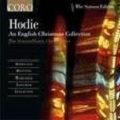
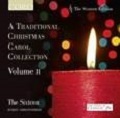 COR16004: Hodie: an English Christmas Collection. The central work in this
collection of English Christmas music of the 20th century by Howells,
Britten, Tavener, Leighton and Warlock is Benjamin Britten’s A
Ceremony of Carols. From thesixteendigital.com (mp3, aac, flac and alac).
COR16004: Hodie: an English Christmas Collection. The central work in this
collection of English Christmas music of the 20th century by Howells,
Britten, Tavener, Leighton and Warlock is Benjamin Britten’s A
Ceremony of Carols. From thesixteendigital.com (mp3, aac, flac and alac).
• COR16085: A Traditional Christmas Carol Collection II. This
collection includes familiar seasonal favourites such as Unto us
a boy is born and It came upon the midnight clear together
with some less well-known gems like The Cherry Tree Carol and Gloucestershire Wassail. From thesixteendigital.com (mp3, aac, flac and alac). A Traditional Christmas Carol Collection I is on COR16043. From thesixteendigital.com (mp3, aac, flac and alac).
I need hardly repeat what I said of the earlier mp3 versions, that the
performances and recordings make these two collections well worth adding
to your Christmas listening.
• 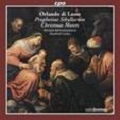 Manfred
Cordes conducts Weser-Renaissance in Christmas Motets by Orlando
di LASSO (1532-1594) on CPO 777468-2 [64:44] – from eclassical.com,
mp3 and lossless, or stream from Naxos Music Library, both with pdf
booklet – interspersed with his settings of the Prophetiæ Sibyllarum,
the Prophecies of the Sibylls. The most famous of these was the Sibyl
of Cumæ, a frightening old woman described in Book VI of Vergil’s Æneid, but she was reputed to have several colleagues across
the Mediterranean world and they were believed to have foretold the
birth of Christ, hence their inclusion here. As Robert Hugill commented
in his review,
the singers could make much more of the words – a polite way of saying
that they are virtually indecipherable. The performances are otherwise
attractive but if it’s the Prophetiæ that you principally
want, there’s a much better recording by the Brabant Ensemble on
Hyperion CDA67887 – see August
2011 DL Roundup.
Manfred
Cordes conducts Weser-Renaissance in Christmas Motets by Orlando
di LASSO (1532-1594) on CPO 777468-2 [64:44] – from eclassical.com,
mp3 and lossless, or stream from Naxos Music Library, both with pdf
booklet – interspersed with his settings of the Prophetiæ Sibyllarum,
the Prophecies of the Sibylls. The most famous of these was the Sibyl
of Cumæ, a frightening old woman described in Book VI of Vergil’s Æneid, but she was reputed to have several colleagues across
the Mediterranean world and they were believed to have foretold the
birth of Christ, hence their inclusion here. As Robert Hugill commented
in his review,
the singers could make much more of the words – a polite way of saying
that they are virtually indecipherable. The performances are otherwise
attractive but if it’s the Prophetiæ that you principally
want, there’s a much better recording by the Brabant Ensemble on
Hyperion CDA67887 – see August
2011 DL Roundup.
• 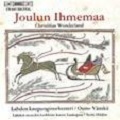 Joulun
ihmemaa (Christmas Wonderland): Finnish Christmas Music
Joulun
ihmemaa (Christmas Wonderland): Finnish Christmas Music
Laulupuu Choir of Lahti
Lahti Symphony Orchestra/Osmo Vänskä
Pdf booklet with texts and translations included
BIS-CD-947 [64:31] – from eclassical.com (mp3 and lossless) or stream from Naxos Music Library
With Christmas still a way off, I find it difficult to listen to the
well-known music for the season, but most of this is unfamiliar enough
to play in mid-November and still be entertaining at Christmas. There’s
Leroy Anderson’s Sleigh Ride, Franz Gruber – Stille Nacht – and Michael Prætorius – Vom Himmel hoch – though all
sung in Finnish here, it isn’t all quite as exclusively unfamiliar
as the subtitle implies. Performances are all that you would expect
from the Lahti SO and Osmo Vänskä and the recording (16-bit
only) is very good. The choir are a bit sugary in Joulun kieli (the
language of Christmas) and Winter Wonderland, but it is a Christmas
recording.
• 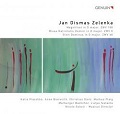 Jan
Dismas ZELENKA (1679-1747) is quite a name to conjure with, especially
as he’s almost the last significant composer in alphabetic order
and wrote some music with the mystifying title Hipocondrie –
hypochondria. That wouldn’t signify if his music were not worth
hearing but this older contemporary of Bach and Handel wrote in a manner
that sometimes prefigures the style of Haydn; his Magnificat in D, ZWV108, Christmas Mass, Missa Nativitatis Domini, ZWV8,
and Dixit Dominus, ZWV68 are good examples. (Genuin GEN11213 [56:46]) The performances by soloists, Marnburg Bach Choir and L’arpa
festante/Nicolo Sokoli do the music justice, though I’d have liked
to hear the words more clearly – partly Zelenka’s fault, I think,
for sometimes pitching even solo voices against powerful instrumentation,
though the singers could have made more of their diction. The music
bounces along in radiant mood; even the Kyries at the beginning
of Mass hardly sound penitent. The lossless recording from eclassical.com is excellent. They also offer mp3 – download both for the one price
– but not the booklet of texts; if you have access to the Naxos Music
Library it’s available there.
Jan
Dismas ZELENKA (1679-1747) is quite a name to conjure with, especially
as he’s almost the last significant composer in alphabetic order
and wrote some music with the mystifying title Hipocondrie –
hypochondria. That wouldn’t signify if his music were not worth
hearing but this older contemporary of Bach and Handel wrote in a manner
that sometimes prefigures the style of Haydn; his Magnificat in D, ZWV108, Christmas Mass, Missa Nativitatis Domini, ZWV8,
and Dixit Dominus, ZWV68 are good examples. (Genuin GEN11213 [56:46]) The performances by soloists, Marnburg Bach Choir and L’arpa
festante/Nicolo Sokoli do the music justice, though I’d have liked
to hear the words more clearly – partly Zelenka’s fault, I think,
for sometimes pitching even solo voices against powerful instrumentation,
though the singers could have made more of their diction. The music
bounces along in radiant mood; even the Kyries at the beginning
of Mass hardly sound penitent. The lossless recording from eclassical.com is excellent. They also offer mp3 – download both for the one price
– but not the booklet of texts; if you have access to the Naxos Music
Library it’s available there.
• BIS offer a strong challenger to this performance of the Magnificat in D, from Masaaki Suzuki, on a recording which also includes the Bach Magnificat, that of his predecessor Kuhnau, and another Zelenka
setting, in C. BIS-CD-1011: download from eclassical.com (mp3 and lossless, with booklet). If you don’t have the Bach, and
even if you do – perhaps from Richard Hickox and his team on Chandos CHAN0518, with Vivaldi – the BIS recording merits serious consideration.
• 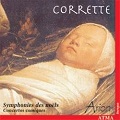 Michel
CORRETTE (1707-1795) Noël Symphonies Nos. 2-6 bounce
along even more. This is music of a type that was popular in 18th-century
France: choral or, in this case, instrumental settings of popular Christmas
tunes. If you know Charpentier’s Messe de Minuit you’ll
recognise the opening movement immediately, a setting of où
s’en vont ces gais bergers, but Corrette casts his net wider
than just the French repertoire.
Michel
CORRETTE (1707-1795) Noël Symphonies Nos. 2-6 bounce
along even more. This is music of a type that was popular in 18th-century
France: choral or, in this case, instrumental settings of popular Christmas
tunes. If you know Charpentier’s Messe de Minuit you’ll
recognise the opening movement immediately, a setting of où
s’en vont ces gais bergers, but Corrette casts his net wider
than just the French repertoire.
The Comic Concertos which complete the album are also fun – some of
the dance movements are borrowed from Rameau’s Les Indes galantes.
Performances are by the Arion Trio (Atma ACD22192 [66:52] – from eclassical.com (mp3 or lossless) or Early Music EMCD-7768, from classicsonline.com (mp3) or stream from Naxos Music Library).
• 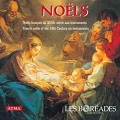
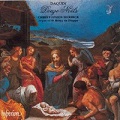 There’s
some overlap with another Atma album of Noëls by CORRETTE, Jean-François DANDRIEU (c.1682-1723) and Louis-Claude
DAQUIN (1694-1772): this time the performers are Les Boréades
de Montréal and the instrumentation is more varied – there’s
even the sound of rustic bagpipes (ACD22118 [56:05] – from eclassical.com (mp3 and lossless)). You may prefer to sample Daquin’s Noëls in organ format, however, from Christopher Herrick on a budget-price
Hyperion CD (CDA66816 – from hyperion-records.co.uk).
Though formerly released on the budget Helios label – review – it now returns to the full-price CDA series for those who order the
CD from the Archive service, but the download is a snip at £4
for mp3 or lossless and the pdf booklet is included – there’s none
with the Atma recordings.
There’s
some overlap with another Atma album of Noëls by CORRETTE, Jean-François DANDRIEU (c.1682-1723) and Louis-Claude
DAQUIN (1694-1772): this time the performers are Les Boréades
de Montréal and the instrumentation is more varied – there’s
even the sound of rustic bagpipes (ACD22118 [56:05] – from eclassical.com (mp3 and lossless)). You may prefer to sample Daquin’s Noëls in organ format, however, from Christopher Herrick on a budget-price
Hyperion CD (CDA66816 – from hyperion-records.co.uk).
Though formerly released on the budget Helios label – review – it now returns to the full-price CDA series for those who order the
CD from the Archive service, but the download is a snip at £4
for mp3 or lossless and the pdf booklet is included – there’s none
with the Atma recordings.
Everest Recordings
The Everest label has been in and out of the UK catalogue over the years
but now almost fifty of their releases are being made available by BMG
on CD and as downloads. I’ve mentioned some of them in earlier
editions and I hope to cover most of these releases. This is by way
of reminding you of those that I’ve covered so far and mentioning
some of the others.
Everest prided themselves on the quality of their early stereo recordings,
many of which were made on 35mm film rather than tape, and most still
sound very well indeed. For that reason US readers should consider HD
Tracks, who offer these recordings in 24-bit sound – some in 24/96
but most in 24/192 – be aware that the latter in particular are very
large files. At present they sell only to US purchasers, so that rules
out prospective purchasers from the rest of the world.
The alternative is iTunes and mp3. I tried some from there, too, and
the results are still very acceptable, especially as some of the tracks
come at rather higher than the customary iTunes 256kbs. As the format
of the original albums has been maintained, timings are short at around
35-45 minutes but the iTunes price of £5.99 or $7.99 partly covers
that. All the albums, from both sources, come with a pdf booklet.
Several of these recordings were released in the UK on the World Record
Club label. I’ve already mentioned in earlier editions the recordings
of the Ralph VAUGHAN WILLIAMS Ninth Symphony (SDBR3006)
and Aaron COPLAND Third Symphony (SDBR3018) as my introductions
to those works, together with Eugene Goossens’ less recommendable Sheherazade (SDBR3026).
• 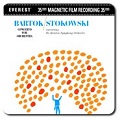 Bela
BARTÓK Concerto for Orchestra played by the Houston
Symphony Orchestra conducted by Leopold Stokowski joins the Vaughan
Williams and Copland as one of the highlights of these reissues. (SDBR3069 [31:54]) Stoki could be wilful but he only occasionally goes over the
top in this recording and the Houston players perform out of their skin
for him. I rate this impassioned reading as a vintage recording of the
work alongside Reiner (RCA) from much the same time and Solti (LSO and
Chicago SO, both Decca).
Bela
BARTÓK Concerto for Orchestra played by the Houston
Symphony Orchestra conducted by Leopold Stokowski joins the Vaughan
Williams and Copland as one of the highlights of these reissues. (SDBR3069 [31:54]) Stoki could be wilful but he only occasionally goes over the
top in this recording and the Houston players perform out of their skin
for him. I rate this impassioned reading as a vintage recording of the
work alongside Reiner (RCA) from much the same time and Solti (LSO and
Chicago SO, both Decca).
That doesn’t mean that the sound is dated; it’s bright and
fresh – perhaps a little too bright. It’s worth spending the extra
on the HD
Tracks 24/96 transfer unless you can’t cope with such a large
file or your system won’t play 24-bit downloads or you think $17.98
too much for just 32 minutes of music. iTunes offer it for £5.99/$7.99 in mp3 – or, strictly speaking, m4a.
• 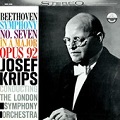 Ludwig
van BEETHOVEN Symphony No.7 in A, Op.92 (SDBR3088 [30:11]).
The London Symphony Orchestra and Josef Krips recorded the whole cycle
of Beethoven symphonies. I owned some of these on World Record Club,
though not the Seventh, and remembered them as very competent but little
more, so I was surprised to find this recording comparable in quality
to the André Cluytens and Colin Davis versions from roughly the
same vintage on Beulah Extra. With recording quality that still sounds
well, this is easily worth the £5.99/$7.99 that iTunes are asking. Most importantly, Krips sets a good pace for the third and
fourth movements – fast enough to justify the ‘apotheosis of the
dance’ tag but not so fast as to come off the rails. There are
other, unofficial, downloads of all the Beethoven symphonies from Krips
– iTunes themselves have the whole set for £5.99 and Amazon one
for even less – but I can’t speak for their quality.
Ludwig
van BEETHOVEN Symphony No.7 in A, Op.92 (SDBR3088 [30:11]).
The London Symphony Orchestra and Josef Krips recorded the whole cycle
of Beethoven symphonies. I owned some of these on World Record Club,
though not the Seventh, and remembered them as very competent but little
more, so I was surprised to find this recording comparable in quality
to the André Cluytens and Colin Davis versions from roughly the
same vintage on Beulah Extra. With recording quality that still sounds
well, this is easily worth the £5.99/$7.99 that iTunes are asking. Most importantly, Krips sets a good pace for the third and
fourth movements – fast enough to justify the ‘apotheosis of the
dance’ tag but not so fast as to come off the rails. There are
other, unofficial, downloads of all the Beethoven symphonies from Krips
– iTunes themselves have the whole set for £5.99 and Amazon one
for even less – but I can’t speak for their quality.
• 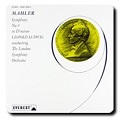 Gustav
MAHLER Symphony No.9 in d minor: London Symphony Orchestra/Leopold
Ludwig (SDBR3050-2 [75:23]). I hadn’t progressed beyond
Mahler’s First and Fourth symphonies when this recording was released
on two World Record Club LPs so I didn’t go for it. There was not
much competition at the time – just Jascha Horenstein on a not well
recorded Vox 3-LP set with the First Symphony – so this became the version
to have until Barbirolli recorded the work with the Berlin Phil.
Gustav
MAHLER Symphony No.9 in d minor: London Symphony Orchestra/Leopold
Ludwig (SDBR3050-2 [75:23]). I hadn’t progressed beyond
Mahler’s First and Fourth symphonies when this recording was released
on two World Record Club LPs so I didn’t go for it. There was not
much competition at the time – just Jascha Horenstein on a not well
recorded Vox 3-LP set with the First Symphony – so this became the version
to have until Barbirolli recorded the work with the Berlin Phil.
That Barbirolli performance remains my go-to CD, but I was very pleasantly
surprised by this Leopold Ludwig account, not least for the quality
of the LSO’s playing and the way that the recording still sounds
bright and fresh, if a trifle brash at times. HD Tracks have it in 24/192
sound – here:
be warned; these are very large files – and iTunes offer it less expensively
in mp3.
• 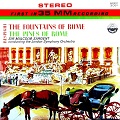 Ottorino
RESPIGHI The Fountains of Rome [15:54] and The Pines of
Rome [20:36] (SDBR3051 [36:30]) were recorded by the London
Symphony Orchestra and Sir Malcolm Sargent. This is Technicolor music
and it requires performance and recording to match. Sargent was a jack
of all musical trades, usually highly competent though not often more,
but he struck gold here, capturing both the brighter and more subdued
aspects of the music, and the recording still sounds very well indeed,
even in mp3. From iTunes (mp3/m4a) with pdf booklet.
Ottorino
RESPIGHI The Fountains of Rome [15:54] and The Pines of
Rome [20:36] (SDBR3051 [36:30]) were recorded by the London
Symphony Orchestra and Sir Malcolm Sargent. This is Technicolor music
and it requires performance and recording to match. Sargent was a jack
of all musical trades, usually highly competent though not often more,
but he struck gold here, capturing both the brighter and more subdued
aspects of the music, and the recording still sounds very well indeed,
even in mp3. From iTunes (mp3/m4a) with pdf booklet.
This might not be my first choice for a recording of this vintage –
that would be Reiner on RCA, more generously coupled – but the Everest
recording is still well worth considering and I’ve enjoyed encountering
it again.
• 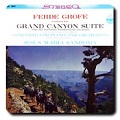 Ferde
GROFÉ’s Grand Canyon Suite [32:08] is also Technicolor
music; it receives an idiomatic performance from the Rochester Philharmonic
Orchestra and the composer on SDBR3044 [47:17] where it’s
coupled with his less well-known Piano Concerto in d minor [15:10] in
which Jesus Maria Sanroma is the soloist. I listened to this in a 24/96
download from HD
tracks; there’s also 24/192 and it’s also available in
humble mp3 guise from iTunes; both sources include the pdf booklet.
With music representing a bucking bronco in On the Trail (tr.3)
and simulated thunder in Cloudburst (tr.5), you might think it
banal but I rather like it. I did find it harder, though, to relate
to the Piano Concerto, which follows too hard on the heels of the Grand
Canyon Suite. The recording is a trifle dry but that suits the music
quite well, especially in the vivid Cloudburst – though that cannot
match the Cincinnati recording on Telarc which pits the orchestra against
real thunder.
Ferde
GROFÉ’s Grand Canyon Suite [32:08] is also Technicolor
music; it receives an idiomatic performance from the Rochester Philharmonic
Orchestra and the composer on SDBR3044 [47:17] where it’s
coupled with his less well-known Piano Concerto in d minor [15:10] in
which Jesus Maria Sanroma is the soloist. I listened to this in a 24/96
download from HD
tracks; there’s also 24/192 and it’s also available in
humble mp3 guise from iTunes; both sources include the pdf booklet.
With music representing a bucking bronco in On the Trail (tr.3)
and simulated thunder in Cloudburst (tr.5), you might think it
banal but I rather like it. I did find it harder, though, to relate
to the Piano Concerto, which follows too hard on the heels of the Grand
Canyon Suite. The recording is a trifle dry but that suits the music
quite well, especially in the vivid Cloudburst – though that cannot
match the Cincinnati recording on Telarc which pits the orchestra against
real thunder.
• 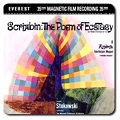 No-one
knew the Alexander SCRIABIN Poème de l’Extase [19:15] better than Leopold Stokowski, whose performance with the Houston
Symphony Orchestra features on SDBR3032 along with the lesser-known Azerbaijan Mugam of Fikret AMIROV [13:13: 32:54 total
time]. The Scriabin doesn’t lack power where needed but the performance
is surprisingly delicate, too. Some of the spice of other performances
is lacking but there’s plenty to compensate and the recording of
both works has worn very well. The coupling is based on Azerbaijan folk
songs; it’s somewhat episodic – at one point you might be forgiven
for thinking a piano concerto had strayed into the mix – but that’s
often the nature of such music and it receives a suitably colourful
performance. I was confident that there wouldn’t be a rival recording
but such is the resourcefulness of Naxos that I see it figures on a
whole CD of Amirov’s music (8.572170 – review).
From HD
Tracks (24/96 lossless) or iTunes (mp3).
No-one
knew the Alexander SCRIABIN Poème de l’Extase [19:15] better than Leopold Stokowski, whose performance with the Houston
Symphony Orchestra features on SDBR3032 along with the lesser-known Azerbaijan Mugam of Fikret AMIROV [13:13: 32:54 total
time]. The Scriabin doesn’t lack power where needed but the performance
is surprisingly delicate, too. Some of the spice of other performances
is lacking but there’s plenty to compensate and the recording of
both works has worn very well. The coupling is based on Azerbaijan folk
songs; it’s somewhat episodic – at one point you might be forgiven
for thinking a piano concerto had strayed into the mix – but that’s
often the nature of such music and it receives a suitably colourful
performance. I was confident that there wouldn’t be a rival recording
but such is the resourcefulness of Naxos that I see it figures on a
whole CD of Amirov’s music (8.572170 – review).
From HD
Tracks (24/96 lossless) or iTunes (mp3).
• 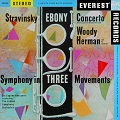 STRAVINSKY’s Ebony Concerto [9:14] is performed by its dedicatee Woody Herman
(clarinet) and his Orchestra on SDBR3009 [32:41] – from iTunes (mp3), both with pdf booklet. The coupling is the Symphony in Three
Movements, with the LSO and Sir Eugene Goossens [23:27].
STRAVINSKY’s Ebony Concerto [9:14] is performed by its dedicatee Woody Herman
(clarinet) and his Orchestra on SDBR3009 [32:41] – from iTunes (mp3), both with pdf booklet. The coupling is the Symphony in Three
Movements, with the LSO and Sir Eugene Goossens [23:27].
This is more valuable for the short concerto than the symphony, of which
there are many more recommendable versions. You could purchase the three
movements of the concerto separately, but crazy pricing means that iTunes
would charge you £0.99 per track – that’s almost half the
cost of the complete album for nine minutes of music.
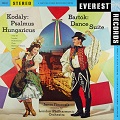
• The value of having a Hungarian at the helm for Zoltan KODÁLY’s
comparatively rare Psalmus Hungaricus [21:44] on SDBR3022 [39:57] is diminished by having it sung in English, though the performance
is powerful enough.
The coupling is a stylish performance of BARTÓK’s Dance Suite [17:13]. János Ferencsik conducts the London
Philharmonic Orchestra in both works, with Raymond Nilsson (tenor) and
the LPO Chorus in the Kodály. From iTunes (mp3) with pdf booklet.
•  Heitor
VILLA-LOBOS The Little Train of the Caipira (from Bachianas
Brasileiras) and Alberto GINASTERA Estancia – ballet
suite and Panambi – ballet suite – was all rare repertoire when
the LP was released and it’s not over-represented even now. You
wouldn’t have expected the London Symphony Orchestra and Sir Eugene
Goossens to have got into the spirit of this South American music, but
they do and the result is most enjoyable, though the LP got a po-faced
response in 1962 and again in 1967. The Little Train is short
but highly entertaining; it features on a budget Classics for Pleasure
which I reviewed some time ago and on a whole album of train-inspired music (Railroad
Rhythms, Hänssler CD93.187)*. Unless you must have the
two Ginastera ballets complete (a more recent LSO on Naxos 8.557582)
this Everest album will still do very nicely, even allowing for the
very short playing time. The recording quality, which is bright and
forward to suit the music, warrants buying the 24-bit lossless. (SDBR3041 [29:10]). From HD Tracks (24/96) – here – or iTunes – here – both with pdf booklet. Incidentally, a glance at my Portuguese dictionary
tells me that I’ve been wrong for years in thinking that Caipira was a place; it’s Brazilian Portuguese for a peasant.
Heitor
VILLA-LOBOS The Little Train of the Caipira (from Bachianas
Brasileiras) and Alberto GINASTERA Estancia – ballet
suite and Panambi – ballet suite – was all rare repertoire when
the LP was released and it’s not over-represented even now. You
wouldn’t have expected the London Symphony Orchestra and Sir Eugene
Goossens to have got into the spirit of this South American music, but
they do and the result is most enjoyable, though the LP got a po-faced
response in 1962 and again in 1967. The Little Train is short
but highly entertaining; it features on a budget Classics for Pleasure
which I reviewed some time ago and on a whole album of train-inspired music (Railroad
Rhythms, Hänssler CD93.187)*. Unless you must have the
two Ginastera ballets complete (a more recent LSO on Naxos 8.557582)
this Everest album will still do very nicely, even allowing for the
very short playing time. The recording quality, which is bright and
forward to suit the music, warrants buying the 24-bit lossless. (SDBR3041 [29:10]). From HD Tracks (24/96) – here – or iTunes – here – both with pdf booklet. Incidentally, a glance at my Portuguese dictionary
tells me that I’ve been wrong for years in thinking that Caipira was a place; it’s Brazilian Portuguese for a peasant.
• 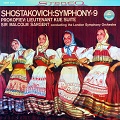
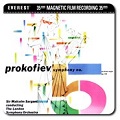 You
wouldn’t normally think of Sir Malcolm Sargent as a great interpreter
of PROKOFIEV or SHOSTAKOVICH but he makes more than a
decent fist of both. When SDBR3054 [46:05] was first released
in the UK on World Record Club, it contained the only current recording
of the Shostakovich Ninth Symphony [25:30]. The coupling is Prokofiev’s Lieutenant Kijé [20:35] – from HD
Tracks (24/96 lossless) or iTunes (mp3). On SDBR3034 he performs Prokofiev’s Fifth Symphony
[42:44] – from HD
Tracks (24/96 lossless) or iTunes (mp3). Tempi are mostly a shade slower than Karajan’s (DG Originals),
except in the third movement where Sargent keeps the music moving faster
at the expense of some of the intensity, but they work well and while
you wouldn’t wish to make either your first choice now, they are
well worth having as alternatives. Both recordings still sound well.
You
wouldn’t normally think of Sir Malcolm Sargent as a great interpreter
of PROKOFIEV or SHOSTAKOVICH but he makes more than a
decent fist of both. When SDBR3054 [46:05] was first released
in the UK on World Record Club, it contained the only current recording
of the Shostakovich Ninth Symphony [25:30]. The coupling is Prokofiev’s Lieutenant Kijé [20:35] – from HD
Tracks (24/96 lossless) or iTunes (mp3). On SDBR3034 he performs Prokofiev’s Fifth Symphony
[42:44] – from HD
Tracks (24/96 lossless) or iTunes (mp3). Tempi are mostly a shade slower than Karajan’s (DG Originals),
except in the third movement where Sargent keeps the music moving faster
at the expense of some of the intensity, but they work well and while
you wouldn’t wish to make either your first choice now, they are
well worth having as alternatives. Both recordings still sound well.
* There’s a less entertaining arrangement for violin and piano
on Marco Polo 8.223527.
***
Recording of the Month
 Johann
Sebastian BACH (1685-1750) Sacred Cantatas Volume 55
Johann
Sebastian BACH (1685-1750) Sacred Cantatas Volume 55
Cantata BWV69 ‘Lobe den Herrn, meine Seele’ (1748) [19:00]
Cantata BWV30 ‘Freue dich, erlöste Schar’ (1738) [33:57]
Cantata BWV191 ‘Gloria in excelsis Deo’ (c.1743-46) [14:17]
Hana Blažíková (soprano); Robin Blaze (counter-tenor);
Gerd Türk (tenor); Peter Kooij (bass)
Bach Collegium Japan/Masaaki Suzuki – rec. February 2013. DDD/DSD
Pdf booklets included
BIS BIS-SACD-2031 [67:14] – from eclassical.com (mp3, 16– and 24-bit lossless)
(See review by David Barker: ‘One of the most important recording projects
of the last few decades has reached its triumphant conclusion’.)
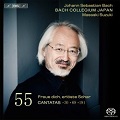 Finis
coronat opus: the end crowns the work. This may not be the only
way to listen to Bach’s cantatas but these recordings from Masaaki
Suzuki for BIS, of which this is the final, triumphant, volume, seem
to find their way into my listening even more often than John Eliot
Gardiner’s complete series for SDG.
Finis
coronat opus: the end crowns the work. This may not be the only
way to listen to Bach’s cantatas but these recordings from Masaaki
Suzuki for BIS, of which this is the final, triumphant, volume, seem
to find their way into my listening even more often than John Eliot
Gardiner’s complete series for SDG.
If I haven’t said it all before, David Barker has done so in his
review, so I’ll merely echo the text of the final work, Gloria
in excelsis, glory to God in the highest. It may not technically
be a cantata, though it’s numbered among them in Schmieder’s
catalogue – it’s actually a movement from one of Bach’s short
Lutheran Masses in a transitional form before it became part of his
great b-minor Mass – but it rounds off the series in superb style, especially
as its Christmas-related text makes it appropriate for the forthcoming
season.
George Frideric HANDEL (1685-1759)
Organ Concerto in g minor Op.4/1 [17:07]
Organ Concerto in B-flat Op.4/2 [10:32]
Organ Concerto in g minor Op.4/3 [11:37]
Organ Concerto in F Op.4/4 [15:46]
Karl Richter Chamber Orchestra/Karl Richter (Steinmeyer organ, Markuskirche,
Munich) – rec. 1958. ADD/stereo
BEULAH EXTRA 2-5BX169 [55:02] – from eavb.co.uk (mp3)
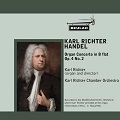 These
recordings are available separately, but together they make an attractive
album of the Op.4 Organ Concertos that can still hold its own in many
ways against modern recordings such as that of Richard Egarr (Harmonia
Mundi) or Ton Koopman, though the latter is an outstanding bargain,
combining the Op.4 and Op.7 works on two Warner Apex budget CDs. Richter’s
use of a modern full-size instrument instead of a chamber organ would
be questionable nowadays, but he compensates by sensitive selection
of stops and the use of a chamber orchestra. In their time these recordings
were excelled only by Thurston Dart’s greater period awareness
– Beulah have already given us Dart’s stylish recordings of Handel’s
solo organ music and the Water Music; perhaps we might now have
his recordings of the Organ Concertos. With the 2-CD Warner Teldec set
of Richter’s Op.4 and Op.7 apparently no longer available, I hope
that Beulah will also bring us the second set. There’s a very inexpensive
Hallmark download which reproduces the original mono LP sleeve, but
I can’t vouch for its quality and one user review on Amazon comments
adversely on the quality of the transfer, whereas the Beulah has been
done with the usual care and the quality is very good indeed for its
age. Even if all other recordings of this music were to fall victim
to spontaneous combustion, I’d be happy enough with these Richter
interpretations.
These
recordings are available separately, but together they make an attractive
album of the Op.4 Organ Concertos that can still hold its own in many
ways against modern recordings such as that of Richard Egarr (Harmonia
Mundi) or Ton Koopman, though the latter is an outstanding bargain,
combining the Op.4 and Op.7 works on two Warner Apex budget CDs. Richter’s
use of a modern full-size instrument instead of a chamber organ would
be questionable nowadays, but he compensates by sensitive selection
of stops and the use of a chamber orchestra. In their time these recordings
were excelled only by Thurston Dart’s greater period awareness
– Beulah have already given us Dart’s stylish recordings of Handel’s
solo organ music and the Water Music; perhaps we might now have
his recordings of the Organ Concertos. With the 2-CD Warner Teldec set
of Richter’s Op.4 and Op.7 apparently no longer available, I hope
that Beulah will also bring us the second set. There’s a very inexpensive
Hallmark download which reproduces the original mono LP sleeve, but
I can’t vouch for its quality and one user review on Amazon comments
adversely on the quality of the transfer, whereas the Beulah has been
done with the usual care and the quality is very good indeed for its
age. Even if all other recordings of this music were to fall victim
to spontaneous combustion, I’d be happy enough with these Richter
interpretations.
Josef HAYDN (1732-1809)
Symphony No.96 in D (Miracle) [22:18]
Symphony No.97 in C [24:24]
Royal Concertgebouw Orchestra/Eduard Van Beinum – rec.1952/3. ADD/mono
BEULAH EXTRA 30-37BX37 [46:42] – from eavb.co.uk (mp3)
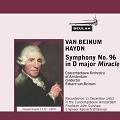 Eduard
van Beinum’s Haydn is stylish – more stylish than Sir Thomas Beecham’s
of a slightly later vintage – and it’s still very enjoyable, but
it just lacks that last degree of magic that Beecham, for all his deliberate
avoidance of the most accurate editions and period style, brought to
the music. (See review of most recent reissue in a 6-CD box set.)
Eduard
van Beinum’s Haydn is stylish – more stylish than Sir Thomas Beecham’s
of a slightly later vintage – and it’s still very enjoyable, but
it just lacks that last degree of magic that Beecham, for all his deliberate
avoidance of the most accurate editions and period style, brought to
the music. (See review of most recent reissue in a 6-CD box set.)
These recordings have been reissued on Australian Decca Eloquence, together
with No.94 (4768483) but you may well prefer their availability
separately and inexpensively from Beulah, especially as the Eloquence
is out of stock at the UK distributor as I write. I haven’t heard
the Eloquence transfer but I doubt if it improves very much on the Beulah.
There’s no disguising that these are early-1950s recordings, but
the sound is as listenable as the performances.
I’ve retained Beulah’s attribution to No.96 of the Miracle title, though some modern research has tended to associate that actual
miracle – the chandelier that fell just behind members of the audience
who had surged forward to applaud – with No.102.
Beulah have also given us two albums of Max Gobermann’s attractive
performances of some of Haydn’s earlier symphonies – see DL
News 2013/2.
Ludwig van BEETHOVEN (1770-1827)
Piano Concerto No.1 in C, Op.15 [36:20]
Piano Concerto No.3 in c minor, Op.37 [36:26]
Ingrid Jacoby (piano)
Sinfonia Varsovia/Jacek Kaspszyk – rec. April 2013. DDD.
Pdf booklet included
ICA CLASSICS ICAC5107 [72:46] – from classicsonline.com (mp3) or stream from Naxos Music Library
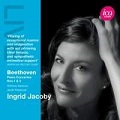 The
performance of the First Concerto begins with a light but expressively
played orchestral ritornello with real clarity of texture; everything
can be heard. Here in the first movement there is some fine playing,
sometimes energetic, sometimes more tranquil in mood. Stephen Kovacevich
and Colin Davis are just a fraction slower in this movement, and also
a touch heavier. Jacoby shows herself to be fully equipped to perform
the virtuosic passages with great deftness and brilliance, but with
a good sense of style too. The Largo second movement, although
slow, never drags and always has a sense of forward movement. Ingrid
Jacoby and her orchestra play with a wide variety of expression. Kovacevich’s
performance has a slightly warmer sound and his performance has a feeling
of greater maturity.
The
performance of the First Concerto begins with a light but expressively
played orchestral ritornello with real clarity of texture; everything
can be heard. Here in the first movement there is some fine playing,
sometimes energetic, sometimes more tranquil in mood. Stephen Kovacevich
and Colin Davis are just a fraction slower in this movement, and also
a touch heavier. Jacoby shows herself to be fully equipped to perform
the virtuosic passages with great deftness and brilliance, but with
a good sense of style too. The Largo second movement, although
slow, never drags and always has a sense of forward movement. Ingrid
Jacoby and her orchestra play with a wide variety of expression. Kovacevich’s
performance has a slightly warmer sound and his performance has a feeling
of greater maturity.
Jacoby gives a superb account of the third movement, full of wit but
also charm where necessary. But Kovacevich is master of these concertos
and in this movement he explores even more expressive possibilities
than Jacoby. Also I feel a little uneasy with some of the slight tempo
changes we sometimes experience which suggest that Jacek Kaspszyk is
not always entirely in control.
The orchestra and conductor establish an appropriate tempo at the start
of the Third Concerto, the first of this composer’s concertos to
show real movement away from the classical works of Haydn and Mozart,
as well as his own first two concertos. There is energy as well as characterful
playing here. Ingrid Jacoby enters stylishly and I like the variety
of articulation she provides.
Jacoby gives a well-controlled performance of the second movement Largo,
full of expression and dynamic contrast. Stephen Kovacevich and Colin
Davis give a similarly slow performance, at least in comparison with
some of today’s modern practitioners. Davis’ orchestra sounds
a bit thick texturally, but it is deeply felt and gives the woodwind
soloists a chance to shine. I love the warm, characterful tone of the
bassoon.
Jacoby and her players give the final movement a rather lightweight
performance which sometimes seems rather jolly in mood. Maybe a little
more drama would be appropriate here. I feel that the main slow theme
which appears in a later episode is rather too slow but it does allow
the fine tone of the orchestra’s principal clarinet to be heard
to good advantage. The faster tempo gradually returns as we move through
a fugato section and the performance romps home in the lively
coda. Stephen Kovacevich and Colin Davis give the main theme more strongly
accentuated performance which helps make for a more dramatic result
and their conclusion is more exhilarating.
Ingrid Jacoby is a fine player who always plays with real musicality,
good phrasing and characterful articulation. She plays with virtuosity
as well as sensitivity. The piano’s high register sounds glittering
and brilliant when needed, though I fear that this may not be to everyone’s
taste. The orchestral playing is excellent and the recording is bright
and clear so can be recommended as a fine and worthy modern performance.
There are, however, many great performances of these works already on
the market including that by Stephen Kovacevich.
Geoffrey Molyneux
Let me merely add that I share Geoff’s general enjoyment of these
performances and his use of the Kovacevich/Davis recordings as his benchmark.
I’ve given the link to classicsonline.com for the mp3 download
of the ICA recording. Wait a little longer, however, and eclassical.com
should have it in mp3 and lossless, albeit slightly more expensively
and without the booklet – they already offer the two earlier releases
in the series in both formats.
The whole set of the Beethoven concertos from Kovacevich and Davis remains
my favourite and the Philips discs make regular forays to my CD player.
They are currently available on mid-price Decca Virtuoso:
• Nos. 1 and 2 4784225
• No. 3 and Violin Concerto (Grumiaux) 4784027
• No. 4 and 5 4783350
Download for £4.99 each from 7digital.com. [BW]
Ludwig van BEETHOVEN
Piano Sonata No.28 in A, Op.101 [21:26]
Piano Sonata No.29 in B-flat, Op.106 (Hammerklavier) [41:44]
Piano Sonata No.30 in E, Op.109 [18:51]
Piano Sonata No.31 in A-flat, Op.110 [19:42]
Piano Sonata No.32 in c minor, Op.111 [27:32]
Igor Levit (piano) – rec. January/February 2013. DDD
SONY CLASSICAL 88883703872 [63:10 + 66:06] – from iTunes (mp3)
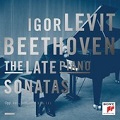 A
first recording by a BBC New Generation artist which challenges the
hegemony of Brendel and Kempff in these mountain peaks of Beethoven’s
late output? Having seen three reviews which said so, I had to listen
for myself. Having purchased it, I see that it’s also become a
MusicWeb International Recording of the Month – see review by Dominy Clements.
A
first recording by a BBC New Generation artist which challenges the
hegemony of Brendel and Kempff in these mountain peaks of Beethoven’s
late output? Having seen three reviews which said so, I had to listen
for myself. Having purchased it, I see that it’s also become a
MusicWeb International Recording of the Month – see review by Dominy Clements.
The first thing that struck me was the cleanness of the playing, with
minimum use of pedal, though with plenty of power brought to bear where
relevant. Apparently Levit has studied baroque keyboard music in preparation
for Beethoven, so it’s hardly surprising if Angela Hewitt’s
Bach and Beethoven came to mind as I listened. The result is that the
light and dark, the contrasting qualities which pervade Beethoven’s
late sonatas and quartets, are very well brought out. One of my reservations
in reviewing a recording of No.30 from Panyiotis Demopoulos (Divine
Art Diversions DDV24142 – review)
was the failure to bring out both the tuneful and barnstorming aspects
of the music but Levit gets that balance just right.
I’m not going to throw out my existing recordings: Nos.30-32 from
Bernard Roberts (Nimbus NI7709) or as part of a complete set
(NI1774) – review – Wilhelm Kempff’s set of Nos. 27-32 on DG, costing a little less,
£7.49, in full 320kb/s sound and with one extra sonata, from 7digital.com and Alfred Brendel’s recordings of Nos.27-32, again at £7.49,
in 320kb/s sound, also from 7digital.com.
Brendel’s later digital recording of Nos. 30-32 is available in
the UK as an import, E4467012. The Roberts recordings, on single
CD or in the box set, can be purchased at competitive prices from MusicWeb
International – follow link to review above for details.
iTunes offer the 2-CD Levit set for £7.99 in a ‘mastered
for iTunes’ transcription. While this is not at the top quality
320 kb/s – more like 258 – the resulting sound is much more than acceptable.
If it must be 320kb/s, sainsburysentertainment.co.uk have the set for £8.99. If you prefer to go for the CDs for the
booklet, though I understand that there’s very little about Levit
there, you should be able to find these for around £11.
(See also Brian Reinhart's review of Menahem Pressler in No. 30, below.)
Franz SCHUBERT (1797-1828) Works for Violin and Fortepiano, Volume
2
Rondo in b minor, Op.70, D895 [16:29]
Introduction and Variations on ‘Trockne Blumen’, Op. posth.160,
D802 [23:27]
Fantasie in C, Op. posth.159, D934 [29:19]
Jacqueline Ross (violin), Maggie Cole (fortepiano) – rec. October/November
2011. DDD
Violin by G B Guadagnini, Turin, 1777. Bow by Etienne Pajeot, early
19th century. Fortepiano by Graf, Vienna, 1826; tuned and prepared by
Alastair Laurence, curator of Finchcocks
Tuning: a' = 430
Pdf booklet included
NAXOS 9.70182 [69:39] Download only – from classicsonline.com (mp3 or lossless) or eclassical.com (mp3 and lossless, no booklet) or stream from Naxos Music Library
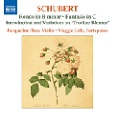 I
reviewed Volume 1 of this series (9.70164) in DL
Roundup August 2012/2 and mentioned both volumes as alternatives
likely to appeal to those who preferred period instruments when reviewing
the 2-CD Hyperion set of all Schubert’s works for violin and piano
(CDA67911/2) in DL
News 2013/14. That earlier Naxos recording – also download only
– included the three sonatas or sonatinas of Op.137, D384, 385 and 408,
and the Sonata Op. post.160, D574.
I
reviewed Volume 1 of this series (9.70164) in DL
Roundup August 2012/2 and mentioned both volumes as alternatives
likely to appeal to those who preferred period instruments when reviewing
the 2-CD Hyperion set of all Schubert’s works for violin and piano
(CDA67911/2) in DL
News 2013/14. That earlier Naxos recording – also download only
– included the three sonatas or sonatinas of Op.137, D384, 385 and 408,
and the Sonata Op. post.160, D574.
I wrote of the first volume that academic research and period instruments
certainly didn’t equate with dull and dry performances and the
same is true of its successor, this time recorded at Finchcocks and
making use of a Graf fortepiano in the collection there. I’m no
lover of the very dry sound of some fortepianos but you would have to
be an out and out hater of the instrument to object to that employed
here. The performances are based on autograph manuscript sources. For
the first two works unequal temperament is employed, with equal temperament
for the Fantasie.
Mss Ross and Cole offer better value than the Hyperion set, though that
in turn is slightly less than the usual cost of downloading two CDs;
the Naxos recordings are just £4.99 (mp3) or £5.99 (lossless)
each from classisconline.com – don’t pay more, sometimes for lower
bit-rates, from other providers, but be aware that classicsonline.com’s
lossless downloads come as one long file; if you wish to have the tracks
separately, the eclassical.com download can be yours for a little more,
at $12.47. Instead of the brief Sei mir gegrüsst* on Hyperion,
Ross and Cole include the substantial and enjoyable Trockne Blumen variations, originally composed for flute and piano but here sitting
very comfortably on violin and piano. The notes are briefer than those
from Hyperion – as usual, those are hard to beat – but the Naxos ones
are informative. For what it’s worth, too, the Redouté rose
on the cover, in keeping with Naxos’s other recordings of Schubert’s
chamber music, is very attractive.
* a more extended set of variations on this tune, in any case, features
in the andantino of the Fantasie (track 13).
Franz LISZT (1811-1886)
Don Juan Fantasy [17:42]
Hungarian Rhapsody No.13 [8:16]
Funérailles: Octobre 1849 [13:26]
Hungarian Rhapsody No.5 [6:14]
Hunnenschlacht [7:02]
Valse Oubliée No.1 [3:48]
Les Préludes [6:20]
Matthew Cameron (piano) – rec. c.2010. DDD
CALA RECORDS [72:48] – from amazon.com, amazon.co.uk or iTunes (mp3).
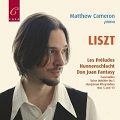 Geoff
Molyneux and I have already written with approval about another Matthew
Cameron piano recital: Romantic Favorites (DL
News 2013/14). That album contained a good deal of Liszt, something
of a speciality for the pianist, so it’s no surprise that this
earlier recording is completely devoted to that composer. I had one
small reservation about the other album, concerning the dramatic content
of La Campanella, but there are no reservations this time: there’s bravura aplenty here, but with delicacy where it’s required.
There’s plenty of dexterity, too, as on the previous album so,
unless you restrict yourself to listening to Liszt from one of the big
names of the past, this album is well worth having. I’m accustomed
to listening to Les Préludes in its orchestral garb and
prefer it that way, but the piano version here is very enjoyable. With
73 minutes on the clock and an attractive price – $6.93 from amazon.com,
or £6.23 from amazon.co.uk – it’s good value, too.
Geoff
Molyneux and I have already written with approval about another Matthew
Cameron piano recital: Romantic Favorites (DL
News 2013/14). That album contained a good deal of Liszt, something
of a speciality for the pianist, so it’s no surprise that this
earlier recording is completely devoted to that composer. I had one
small reservation about the other album, concerning the dramatic content
of La Campanella, but there are no reservations this time: there’s bravura aplenty here, but with delicacy where it’s required.
There’s plenty of dexterity, too, as on the previous album so,
unless you restrict yourself to listening to Liszt from one of the big
names of the past, this album is well worth having. I’m accustomed
to listening to Les Préludes in its orchestral garb and
prefer it that way, but the piano version here is very enjoyable. With
73 minutes on the clock and an attractive price – $6.93 from amazon.com,
or £6.23 from amazon.co.uk – it’s good value, too.
There was one very small glitch in the files which I received for review
but the Amazon and iTunes downloads, at a nominal 256kb/s rather than
the 192kb/s which I heard, should be fine.
The Art of Johannes BRAHMS (1833-1897)
Tragic Overture, Op.81 [12:30]
Philharmonia Orchestrea/Otto Klemperer – rec. 1961 ADD/stereo
Violin Concerto in D, Op.77 [41:03]
Endre Wolf (violin); Sinfonia of London/Anthony Collins – rec. 1958
ADD/stereo
Hungarian Dances, WoO1, Nos. 1-3, 5-7 and 10 [18:54]
Hamburg Radio Symphony Orchestra/Hans Schmidt-Isserstedt – rec. 1953.
ADD/mono
BEULAH 1PD84 [72:27] – due for release by amazon.co.uk and iTunes
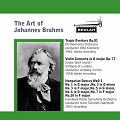 Klemperer
is for me the Brahms conductor par excellence and nowhere more
so than in the Tragic Overture, which benefits particularly from
his rather weighty style and still sounds very well in this transfer.
Not that weighty necessarily means ponderous: Klemperer’s 12:30
is faster than Marin Alsop’s 14:04 (with Symphony No.1 and Academic
Overture, Naxos) and only a shade slower than Riccardo Chailly’s
11:45 with the Leipzig Gewandhaus Orchestra on his new Decca set of
the symphonies and orchestral works (4785344). Chailly makes
the opening of the work sound sprightlier, which some may prefer, but
this is the Tragic Overture and, for all that I’ve
enjoyed hearing Chailly’s new recordings of the symphonies, I prefer
Klemperer in this overture.
Klemperer
is for me the Brahms conductor par excellence and nowhere more
so than in the Tragic Overture, which benefits particularly from
his rather weighty style and still sounds very well in this transfer.
Not that weighty necessarily means ponderous: Klemperer’s 12:30
is faster than Marin Alsop’s 14:04 (with Symphony No.1 and Academic
Overture, Naxos) and only a shade slower than Riccardo Chailly’s
11:45 with the Leipzig Gewandhaus Orchestra on his new Decca set of
the symphonies and orchestral works (4785344). Chailly makes
the opening of the work sound sprightlier, which some may prefer, but
this is the Tragic Overture and, for all that I’ve
enjoyed hearing Chailly’s new recordings of the symphonies, I prefer
Klemperer in this overture.
The Violin Concerto comes from a World Record Club release and the performance
is new to me. Tempo is of the essence in the first movement of this
work, with most interpretations taken too slow for anyone who, like
me, cut their musical teeth on Heifetz and Reiner, Reiner’s remake
with Szeryng or Szeryng with Monteux (all RCA). Wolf and Collins take
22:51, which is around the norm, but a little too dreamy for me, despite
the urgency of the solo and orchestral playing. Listen to Heifetz’s
18:51 – try it from Naxos
Music Library if you can – and I think you won’t want to hear
it any other way, but if you still prefer dreamy for this movement,
Wolf and Collins could be your men in this good transfer. The YouTube excerpt from the first movement might help you decide.
When this recording of the concerto was made, just the one work was
deemed sufficient for an LP but Beulah make up good value with the Tragic
Overture and seven of the Hungarian Dances, the latter taken
from a 1953 10” LP (LW5066). Inevitably the sound is several
notches below that on the rest of the album but perfectly tolerable,
especially as the over-bright top of the LP has been tamed. If iTunes
and Amazon can come close to matching the sound of the lossless (wav)
version of this album – would that they would take leaf out of the books
of others and offer 320kb/s mp3 or even lossless – you should have no
complaints.
Pyotr Il’yich TCHAIKOVSKY (1840-1893)
Swan Lake, Op.20: ballet in four acts (1877)
James Ehnes (violin)
Bergen Philharmonic Orchestra/Neeme Järvi
Rec. Grieghallen, Bergen, Norway, 18 June and 3-6 December 2012. DDD/DSD
CHANDOS Hybrid SACD CHSA5124 [2 CDs: 81:17 + 73:24 = 154:41]
[also available as CHAN5124, mp3,16– and 24bit lossless download
from theclassicalshop.net.]
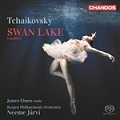 We
weren’t exactly short of highly favoured versions of Swan Lake,
so any new recording has to have a distinctive selling point to compete.
In this case it’s the high-quality recording, available as a hybrid
SACD and a lossless download, though I was too early for the 24-bit
variety. As with classicsonline.com’s flac downloads, often posted
later than the mp3, the early bird doesn’t always get the worm.
We
weren’t exactly short of highly favoured versions of Swan Lake,
so any new recording has to have a distinctive selling point to compete.
In this case it’s the high-quality recording, available as a hybrid
SACD and a lossless download, though I was too early for the 24-bit
variety. As with classicsonline.com’s flac downloads, often posted
later than the mp3, the early bird doesn’t always get the worm.
Among those recordings which I’ve heard in various formats the
ones to rival or excel include:
• LSO/André Previn – a strong contender on a budget EMI twofer
(9676842) or even less expensively as an mp3 download from sainsburysentertainment.co.uk or classicsonline.com,
both at £4.99. The 1976 recording needs hardly any allowance for
its age. See review and download
review of earlier CFP release.
• Minneapolis SO/Antal Doráti – a transcription from Past Classics,
of a 1957 recording which shows its age but sounds tolerable and enshrines
a performance still very well worth hearing – see download
review of this and the Fistoulari on the same label.
• LSO/Anatole Fistoulari – about two thirds of the score recorded in
mono in 1952; another Naxos Classical Archive download.
• Concertgebouw/Anatole Fistoulari (excerpts) – Fistoulari’s single-LP
stereo remake from 1961: Decca Eloquence 4429032: Bargain
of the Month – review.
• Philadelphia Orchestra/Wolfgang Sawallisch, EMI Gemini 5855412,
another very worthwhile budget-price twofer.
• Montréal SO/Charles Dutoit, Decca 4783097, 2 CDs at
mid price.
• Mariinsky Theatre O/Valery Gergiev – not as ‘complete’ as
claimed: it’s actually the 3-act performing edition from 1895.
Decca 4757669 – download
review: now available from 7digital.com.
76 minutes of highlights also from 7digital.com.
As with Neeme Järvi’s earlier Chandos recording of Sleeping
Beauty (CHSA5113 – download
review) I absorbed as many of these earlier versions as I could
before listening in detail to the new recording. I enjoyed that recording
of Sleeping Beauty, as did Dave Billinge, though Nick Barnard had mixed
feelings – joint review – and the new recording shares its virtues.
Well worth considering especially for the SACD and 24-bit sound quality.
Look out for my review on the main pages of MusicWeb International of The Nutcracker,
a production from Dutch National Ballet recently reissued on blu-ray
at budget price (£8 or less) and which I enjoyed.
The Art of Leoš JANÁČEK (1854-1928)
Katyá Kabanová: Prelude [4:49]
Sinfonietta [25:08]
Pro Arte Orchestra/Sir Charles Mackerras – rec. 1959. ADD/stereo
Glagolitic Mass [39:49]
Eduard Haken (bass), Vera Soukupova (contralto), Beno Blachut (tenor),
Libuse Domaninska (soprano), Jaroslav Vodrazka (organ)
Czech Philharmonic Orchestra, Prague Philharmonic Choir/Karel Ančerl
– rec. 1961. ADD/stereo
BEULAH 1PD66 [69:36] – from iTunes (mp3)
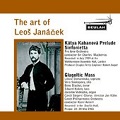 The
music of Janáček never had better interpreters than Sir
Charles Mackerras and Karel Ančerl. I’ve already commended
the Mackerras items in Beulah Extra form: Sinfonietta 2013/11, Kátya Kabanová Prelude, 2013/14.
Even the slightly harsh recording seems appropriate to the music.
The
music of Janáček never had better interpreters than Sir
Charles Mackerras and Karel Ančerl. I’ve already commended
the Mackerras items in Beulah Extra form: Sinfonietta 2013/11, Kátya Kabanová Prelude, 2013/14.
Even the slightly harsh recording seems appropriate to the music.
Hearing the Ančerl recording of the Glagolitic Mass on a
17/6 (£0.87) Supraphon recording (stereo, too, for that bargain
price) was an eye-opener; as an undergraduate I probably terrorised
my neighbours by repeatedly playing it at full blast. Like all Supraphon
LPs, it had none too quiet surfaces; when I caught up with it again
on cassette, the crackle had gone but so had some of the power of the
recording.
Having gone for Mackerras’s version on Supraphon as a download,
I was pleased to make the acquaintance of the Ančerl again and
to see how well Beulah had managed to tame the noise without taming
the music. It sounds its age more than the Sinfonietta but not
by much, and the powerful performance is still well worth having as
a pendant to the Mackerras (My Life with Czech Music, Supraphon SU40422, 4 CDs, or his recording of the original version on Chandos CHAN9310). You can play this Beulah transcription at full blast
without fear of noise or distortion. Try not to annoy the neighbours.
Sergei PROKOFIEV (1891-1953)
The Love for Three Oranges, Op.33 (1919) (complete opera, sung
in Russian)
Viktor Ribinsky (bass) – Le Roi de Trèfle
Nina Polyakova (soprano) – Fata Morgana
Lyutsia Rashkovets (contralto) – La Princesse Clarice
Vladimir Makhov (tenor) – Le Prince
Boris Dobrin (baritone) – Léandre
Yuri Yelnikov (tenor) – Truffaldino
Ivan Budrin (baritone) – Pantalon
Gennady Troitzky (bass) – Tchélio
Tamara Yerofeyeva (contralto) – Linette
Tamara Medvedeva (mezzo) – Nicolette
Tatyana Kallistratova (soprano) – Ninette
Georgi Abramov (bass) – La Cuisinière
Yuri Yakushev (bass) – Farfarello
Nina Postavnicheva (mezzo) – Sméraldine
Ivan Kartavenko (tenor) – Le Maître de Cérémonies
Miroslav Markov (bass) – Le Hérault
Moscow Radio Soloists, Chorus and Symphony Orchestra/Jemal Dalgat –
rec. 1962 ADD/stereo
BEULAH 1PD46 [103:56] – from iTunes or amazon.co.uk (mp3)
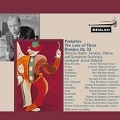 The
Suite which Prokofiev made from this opera is well enough known but
the opera itself is a rare beast, especially when sung as here in Russian.
The two most easily obtained current recordings are in English and French,
with Gergiev’s Russian recording now in a box set or download only
in the UK. If you’re trying to place this recording, made in 1961
or 1962 for Melodiya but not released in the UK on EMI until 1971, the
conductor’s name is variously transliterated as Dzhamal or Jamal,
Dalgat or Dalghat.
The
Suite which Prokofiev made from this opera is well enough known but
the opera itself is a rare beast, especially when sung as here in Russian.
The two most easily obtained current recordings are in English and French,
with Gergiev’s Russian recording now in a box set or download only
in the UK. If you’re trying to place this recording, made in 1961
or 1962 for Melodiya but not released in the UK on EMI until 1971, the
conductor’s name is variously transliterated as Dzhamal or Jamal,
Dalgat or Dalghat.
This is not one of Prokofiev’s many masterpieces but I enjoyed
hearing this vigorous performance – it’s not surprising that Chicago
took to it in 1921 – and the quality of the re-mastered sound is miraculous
for anyone who remembers any of the MK LPs which reached these shores.
Note the playing time – this is excellent value for the price of one
album, less than £8, a fraction of the price of the Melodiya CDs
of this performance. There’s no libretto or even synopsis, but
the plot is virtually nonsensical and Chandos generously offer the pdf
booklet which comes with their recording in English to all comers: CHAN10347.
One small grumble: Beulah give the title as The Love of Three Oranges – though that title is common, I understand that The Love for Three Oranges is more correct.
Dmitri SHOSTAKOVICH (1906-1975)
The Execution of Stepan Razin, Op. 119 (1964) [27:33]
Symphony No. 9 in E flat (1945) [23:54]
Vitali Gromadsky (bass)
Russian State Cappella
Moscow Philharmonic Orchestra/Kirill Kondrashin – rec. 1965. Transferred
from Angel/Melodiya four-track tape
Pdf artwork/sleeve notes included
HDDL397 [51:27] – from HDTT (24/96 & 24/192 flacs)
Symphony No. 6 in b minor, Op. 54 (1939) [32:37]
The Execution of Stepan Razin, Op. 119 (1964) [26:16]
Anatoly Lochak (bass)
Russian State Symphonic Cappella
Russian State Symphony Orchestra/Valeri Polyansky -rec. 18 June 1999,
Mosfilm Studio, Moscow (symphony); 14 June 2000, Grand Hall of the Moscow
Conservatory (Stepan Razin)
Pdf booklet included
CHANDOS CHAN9813 [59:00] – from theclassicalshop.net (mp3, 16-bit CD quality)
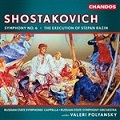
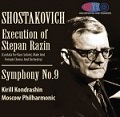 I
recently reviewed Vladimir Ashkenazy and the Helsinki Phil’s new
Shostakovich disc from Ondine, which includes The Execution of Stepan
Razin; that prompted me to revisit other recordings of this seldom-heard
score. I was especially intrigued to see that HDTT have re-mastered
Kondrashin’s classic account, coupled with the Ninth Symphony,
and ordered the 24/96 flacs for review. As for Valeri Polyansky he’s
no slouch when it comes to Shostakovich, and his three volumes of the
composer’s film scores are well worth investigating (review).
Polyansky’s Razin – coupled with the Sixth Symphony – is
reviewed here in its 16-bit form, although the website states it was
originally recorded in 24/96.
I
recently reviewed Vladimir Ashkenazy and the Helsinki Phil’s new
Shostakovich disc from Ondine, which includes The Execution of Stepan
Razin; that prompted me to revisit other recordings of this seldom-heard
score. I was especially intrigued to see that HDTT have re-mastered
Kondrashin’s classic account, coupled with the Ninth Symphony,
and ordered the 24/96 flacs for review. As for Valeri Polyansky he’s
no slouch when it comes to Shostakovich, and his three volumes of the
composer’s film scores are well worth investigating (review).
Polyansky’s Razin – coupled with the Sixth Symphony – is
reviewed here in its 16-bit form, although the website states it was
originally recorded in 24/96.
The headline act here is Kondrashin, whose Shostakovich recordings have
a very special place in the hearts of all DSCH devotees. Thankfully
the raw Soviet-era sound of the Melodiya LPs was tamed in both the Aulos
set (review)
and the Melodiya box (review);
more importantly, judicious re-mastering has preserved the heat and
energy of these unique performances. Indeed, after listening to Polyansky’s
Sixth I turned to Kondrashin on Aulos and was swept away once more by
its momentum and dramatic coherence. Polyansky strikes me as rather
more heart-on-sleeve in the opening Largo, whereas Kondrashin
is direct and unsentimental yet loses nothing of the symphony’s
ambiguities.
Polyansky’s Russian band are remarkably refined, and the more spectral
moments in this opening movement are beautifully done, although I do
find Kondrashin brings out the work’s Mahlerian moods better than
most. Moreover, Polyansky’s gaunt climaxes, though thrilling, aren’t
quite so overwhelming; that said, he does find a chill in the Largo that’s most effective. He also brings a sustained intensity to
those long-breathed passages that’s utterly compelling. So different
from Kondrashin, yet equally compelling in his own way.
One might long for the rougher edges and singleness of purpose that
characterise the Kondrashin account, but the immaculate playing of the
Russian State Orchestra and the fine recording make Polyansky’s
Sixth very persuasive indeed. The mix of bright detail and deep, punctuating
weight in the strange Allegro is impressive, and it’s only
in the Presto that I miss Kondrashin’s more dishevelled progress.
Still, there’s plenty of sardonic humour – what the nay-sayers
call banalities – and while Polyansky’s closing pages aren’t
as pell-mellish as Kondrashin’s they are more tidily recorded.
Assuming that most downloaders also have – and will continue to buy
– physical discs I will point to Mark Wigglesworth on BIS, André
Previn on EMI/Warner and Dmitri Kitaienko on Capriccio (review)
as very decent CD Sixths. I would happily recommend Kondrashin and Polyansky
to anyone interested in this unjustly neglected work. As far as I know
the Kondrashin is only available as part of those Aulos and Melodiya
boxes, but perhaps HDTT will rectify that some time soon.
Which leads me very neatly to their transfer of the Ninth. The opening Allegro is as nimble and quick-witted as ever, but the re-mastering
is just astonishing in its added range and tonal sophistication. Indeed,
only hints of raggedness in the tuttis betray the recording’s
provenance; even so, it’s well balanced and the timbres are true.
The side drums snap more decisively than ever, and Kondrashin is brisk
but never rushed. A good indication of the sonic superiority of this
fine transfer is the deliciously tactile woodwind playing in the Moderato,
the mercurial trumpets in the Presto and the lugubrious tuba in the Largo.
Few performances of the Ninth are as satisfying as this, for it spans
such a wide spectrum of moods and colours. On CD I wouldn’t want
to be without Wigglesworth (BIS) or Haitink (Decca). The latter – perhaps
destined to be reborn as one of UMG’s high-res BD-As – is impeccably
pointed, and I return to it often. That said, HDTT have reinvigorated
Kondrashin’s already indispensable Ninth and I’m sure I’ll
revisit that many times too.
Now for The Execution of Stepan Razin, the tale of the eponymous
17th-century rebel who tried to overthrow the Tsar and was executed
for his pains. Bizarrely, Razin’s decapitated head continues to
defy church and state, which makes it a pertinent piece for the Soviet
Union’s artistic ‘thaw’ of the early 1960s. In my review
of the Ondine CD I remarked on the intelligent and persuasive singing
of the Chinese bass-baritone Shenyang, although he – and all others
– tremble before Kondrashin’s mighty bass Vitali Gromadsky.
Polyansky’s Russian forces certainly have the rasp and robustness
the piece demands and his mixed chorus – nicely arrayed in a pleasing
soundscape – sing well; what a pity the performance is let down by the
wide vibrato of his bass, Anatoly Lochak. I also find the recording
– taped in a different venue – gets a tad relentless after a while.
Gerard Schwarz (Naxos) and Herbert Kegel (Decca) sound somewhat anaemic
in this red-blooded Russian company, and neither of their basses is
entirely convincing either.
For sheer propulsion and unflinching defiance Kondrashin and his impassioned
forces are without peer in Stepan Razin, and the HDTT transfer
drives home that point most forcefully. True, choral climaxes are very
constricted, but their crisp diction and the recording’s vivid,
widescreen presentation can’t fail to thrill. As in the Sixth Symphony
Polyansky teases out buried colours and rhythmic nuances rather more
successfully than Kondrashin, although he does lose essential thrust
in the process. The hopping fleas and other pictorial touches are well
managed in both performances.
Gromadsky’s flesh-and-blood portrayal of Razin is utterly convincing
and Kondrashin judges the work’s dramatic peaks to perfection.
His yelping chorus and death drums are blood-curdling, too. Even if
the ending seems a little anti-climactic Stepan Razin remains one of
Shostakovich’s most vital and interesting scores. No, not in the
same league as ‘Babi Yar’ – with which it’s often compared
– but well worth hearing nonetheless.
I’d be happy with Polyansky and Kondrashin in these symphonies,
but for Op. 119 the choice is much simpler; it’s Kondrashin by
a country mile, especially in this fine new transfer. Unfortunately
HDTT’s cover art/sleeve notes are a mess and could do with some
careful proof-reading; they certainly can’t compete with the detailed
booklets that Chandos supply. Still, that matters less when the transfer
is this good.
Kondrashin is electrifying in both works; the more subtle Polyansky
is good in the symphony, but he’s let down in Op. 119 by a disappointing
bass.
Dan Morgan
http://twitter.com/mahlerei
American Piano Concertos
Samuel BARBER (1910-1982) Concerto for piano and orchestra, Op.38
(1962) [27:40]
Aaron COPLAND (1900-1990) Concerto for piano and orchestra (1926)
[15:39]
George GERSHWIN (1898-1937) Concerto (1935) [31:53]
Xiayin Wang (piano); Royal Scottish National Orchestra/Peter Oundjian
– rec. February and April 2013.
Pdf booklet available
CHANDOS CHAN5128 [75:44] – from theclassicalshop.net (SACD – CHSA5128 – mp3, 16– and 24-bit lossless and surround
sound)
 The
new coupling cuts across previous recommendations:
The
new coupling cuts across previous recommendations:
• BARBER: Piano Concerto (John Browning/George Szell), Violin
Concerto, etc. – Sony SBK87948 – review and Bargain of the Month review.
Now superseded by Sony 88697529892 or Sony SMK89751 (Piano,
Violin and Cello Concertos), both at mid price.
• COPLAND: Piano Concerto and The Tender Land Suite (Benjamin
Pasternack/Robert Hanson) Naxos 8.559297 – review and Bargain of the Month review
• GERSHWIN: Piano Concerto and Second Rhapsody (Orion Weiss/JoAnn
Falletta) Naxos – 8.559705 – April
2012/1 DL Roundup or one of André Previn’s recordings
– for CBS (now Sony 82876787682), EMI (now Warner Parlophone 4332882 – review – or 9671352 – review and review)
and Decca (4782120) all at mid price.
Of these the Browning/Szell remains the benchmark for the Barber, making
a work that’s less approachable than his Violin Concerto more amenable
and, adverse comments which I’ve seen about the quality of the
UK CD aside, this remains my benchmark. By comparison, if you didn’t
know the music I think you’d have to listen to the concerto several
times in the new Chandos recording to get into the music. In some ways
this may be the more idiomatic reading of a work that makes few concessions.
The other concertos are less well known, largely, I think, because their
respective composers’ better-known works (Appalachian Spring, Rhapsody in Blue) have overshadowed them. Coupling them with
this competitive version of the Barber should help to get them better
known, as they deserve to be, especially the short jazz-inspired Copland.
The Gershwin may not have the pizzazz of Rhapsody in Blue but
it receives an idiomatic performance here which reminds us that it’s
at least by the same composer.
Both Xiayin Wang and the RSNO play very well under the direction of
Peter Oundjian; if this is the coupling that appeals to you, I see no
good reasons not to go for it. The 24/96 Chandos download is clearly
superior to the older CBS/Sony recordings in particular and the download
comes complete with pdf booklet. Try listening via Naxos Music Library
if you can.
Benjamin BRITTEN (1913-1977) Britten 100: Britten to America
The Ascent of F6: Incidental music [32:50]
An American in England: Women of Britain [17:30]
Roman Wall Blues [2:19]
On the Frontier: Incidental music [23:20]
Britain to America: Where do we go from here? [2:06]
Samuel West (narrator), Andrew Kennedy (tenor), Jean Rigby (mezzo),
Mary Carewe (mezzo), Huw Watkins (piano)
Ex Cathedra/Jeffrey Skidmore
Hallé Orchestra/Sir Mark Elder, Harry Ogg – rec. 2013. DDD
Pdf booklet included
NMC NMCD190 [78:41] Due for release on 9 December 2013.
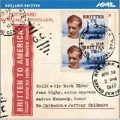 NMC
round off Britten centenary year with some minor works which have never
been recorded. I can’t claim that there are any neglected masterpieces
among these settings of words by WH Auden, Christopher Isherwood and
Louis MacNeice, made on his return from America with Peter Pears during
World War II. The music was written at the time that Peter Grimes and
the Serenade for tenor, horn and orchestra were gestating and shares
some of the qualities of those works, to which it forms an interesting
pendant. Though a conscientious objector, Britten did his bit for the
war effort with two of these works, An American in England and Britain to America, BBC/NBC co-productions designed to make the
people of the USA aware of wartime conditions in the UK.
NMC
round off Britten centenary year with some minor works which have never
been recorded. I can’t claim that there are any neglected masterpieces
among these settings of words by WH Auden, Christopher Isherwood and
Louis MacNeice, made on his return from America with Peter Pears during
World War II. The music was written at the time that Peter Grimes and
the Serenade for tenor, horn and orchestra were gestating and shares
some of the qualities of those works, to which it forms an interesting
pendant. Though a conscientious objector, Britten did his bit for the
war effort with two of these works, An American in England and Britain to America, BBC/NBC co-productions designed to make the
people of the USA aware of wartime conditions in the UK.
The music is dated only in the same sense that Auden’s poetry of
the period is dated, i.e. it’s clearly of its time, but it still
has relevance in a world about to remember the outbreak of WWI and,
inevitably, WWII. The performances could hardly be bettered, so that
if any of these works should be recorded again, they would serve as
benchmarks. At the time of writing the album is scheduled for release
on CD in early December, when I take it that it will also appear as
a download from Amazon and iTunes, though in mp3, not in the lossless
(wav) format which I received for review.
Benjamin BRITTEN Works for string orchestra
Variations on a theme of Frank Bridge, Op.10 [27:12]
Simple Symphony, Op.4 [17:34]
Lachrymae for viola and strings, Op.48a [14:15]
Two Portraits [13:44]
Elegy for Strings (world premiere recording) [8:10]
Camerata Nordica/Terje Tønnesen
Pdf booklet included
BIS-SACD-2060 [80:55] – from eclassical.com (mp3, 16– and 24-bit lossless)
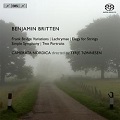 I
could easily have made this my Discovery of the Month – not for the
music, of which there are several rival recordings, but for the performances.
Expectations can be extremely deceptive. My first thought on seeing
a Norwegian orchestra performing Britten was Dr Johnson’s remark
about a female preacher he had heard – that it wasn’t well done
but, as in the case of seeing a dog standing on its hind legs, the miracle
was that it was done at all. I don’t know what the good – but highly
prejudiced, even for his own day – Doctor would have thought of women
priests and bishops or of Britten’s music, let alone in a Norwegian
performance, but even on first run-through I was very favourably impressed
with the power of this performance of the Bridge Variations,
enhanced as always by the immediacy of the BIS recording, especially
in 24-bit format.
I
could easily have made this my Discovery of the Month – not for the
music, of which there are several rival recordings, but for the performances.
Expectations can be extremely deceptive. My first thought on seeing
a Norwegian orchestra performing Britten was Dr Johnson’s remark
about a female preacher he had heard – that it wasn’t well done
but, as in the case of seeing a dog standing on its hind legs, the miracle
was that it was done at all. I don’t know what the good – but highly
prejudiced, even for his own day – Doctor would have thought of women
priests and bishops or of Britten’s music, let alone in a Norwegian
performance, but even on first run-through I was very favourably impressed
with the power of this performance of the Bridge Variations,
enhanced as always by the immediacy of the BIS recording, especially
in 24-bit format.
I’m not going to abandon the excellent budget-price Andrew Davis
recording of the Variations (Warner Apex 8573890822, with Young Person’s Guide – review of earlier 4-CD release) or Ivan Volkov’s of Lachrymæ (Hyperion CDA67801 – Recording of the Month: review and DL
Roundup February 2012/1), but this new recording runs them very
close. The remaining works here also rival other recordings, including
Britten’s own account of the entertaining Simple Symphony.
With a unique coupling and the inclusion of a first recording, this
is well worth considering.
Benjamin BRITTEN
String Quartet No. 1 in D, Op.25 (1941) [24:11]
String Quartet No. 2 in C, Op.36 (1945) [26:52]
String Quartet No. 3, Op.94 (1975) [25:33]
Takács Quartet – rec. February 2013. DDD
Pdf booklet included.
HYPERION CDA68004 [75:53] – from hyperion-records.co.uk (mp3, 16– and 24-bit lossless)
String Quartet No. 1 in D, Op.25 [25:44]
String Quartet No. 2 in C, Op.36 [27:26]
String Quartet No. 3, Op.94 [25:33]
Three Divertimenti [9:52]
The Endellion String Quartet – rec. July 2013. DDD.
WARNER 2564642008 [53:10 + 35:25] – from sainsburysentertainment.co.uk (mp3) or stream from Naxos Music Library
String Quartet No.1 in D, Op.25 [21:21]
Alla Marcia (1933) [3:08]
String Quartet No.3 [26:17]
Emperor Quartet – rec. May 2005. DDD/DSD.
pdf booklet included
BIS-SACD-1570 [55:40] – from eclassical.com (mp3 and lossless) or stream from Naxos Music Library
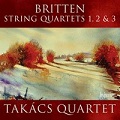
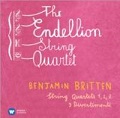
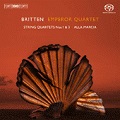 Takács:
renowned for their Beethoven and Schubert recordings, the Takács
Quartet now turn their attention to Britten. With slightly faster tempi
than the Endellion Quartet, they fit all three ‘regular’ quartets
on one CD, which makes them good value; mp3 and 16-bit lossless are
available for only a little more than the Endellions’ download,
with 24-bit just a little extra. The recordings, made in Nimbus’s
Wyastone Hall Studios, are very good.
Takács:
renowned for their Beethoven and Schubert recordings, the Takács
Quartet now turn their attention to Britten. With slightly faster tempi
than the Endellion Quartet, they fit all three ‘regular’ quartets
on one CD, which makes them good value; mp3 and 16-bit lossless are
available for only a little more than the Endellions’ download,
with 24-bit just a little extra. The recordings, made in Nimbus’s
Wyastone Hall Studios, are very good.
Endellion: This is a new recording made in July 2013, not a reissue
of their older performances, which remain available in a 6-CD box, also
in 13-CD and 37-CD sets. The three numbered quartets could have been
fitted on one CD, with a squeeze, so spreading to a second disc, even
with the addition of the short Divertimenti, makes this less
attractive than the Hyperion on CD, but the sainsburysentertainment.co.uk
price of £6.99 redresses the balance.
Emperor: This is also rather short value, but the eclassical.com
per-second pricing policy takes care of that. To obtain their recording
of No.2, however, involves the purchase of a second disc or download, BIS-SACD-1540, on which you’ll also find the Three Divertimenti,
the Miniature Suite and the String Quartet in D. If there were
prizes for best cover, these BIS recordings, sporting Maggi Hambling’s
giant Sea Shell, would win it.
All three recordings are well worth considering but for the convenience
of having all three acknowledged quartets on one recording and for the
quality of performances and recording my final vote goes to the Takács
on Hyperion.
Music of England Volume 5
Malcolm ARNOLD Symphony No.3 [34:54]
London Philharmonic Orchestra/Malcolm Arnold ADD/stereo
BUTTERWORTH A Shropshire Lad – Rhapsody [8:24]
Hallé Orchestra/Sir Adrian Boult – rec. 1942. ADD/mono
Ralph VAUGHAN WILLIAMS Symphony No.3 (Pastoral) [25:40]
Margaret Ritchie (soprano); London Philharmonic Orchestra/Sir Adrian
Boult ADD/mono
BEULAH 5PD76 [78:23] – from iTunes and Amazon.co.uk (mp3)
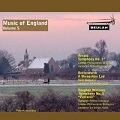 Beulah
are giving us Sir Adrian Boult’s mono recordings of the VW symphonies
piecemeal, coupled with other 20th-century English music. Unless you
must have all your VW together, this is an excellent scheme, especially
when the couplings are as good as they are here.
Beulah
are giving us Sir Adrian Boult’s mono recordings of the VW symphonies
piecemeal, coupled with other 20th-century English music. Unless you
must have all your VW together, this is an excellent scheme, especially
when the couplings are as good as they are here.
Arnold’s own recording of his Third Symphony, made for Everest,
is definitive; it comes in a very good transfer and in stereo. There
is a CD reissue on the Phoenix label but it’s currently out of
stock in the UK and it’s considerably more expensive. Fans of hi-res
sound may wish to wait to see if it reappears from HD Tracks, like some
of the other Everest reissues which I’ve listed earlier, but most
will be happy with Beulah’s transfer – if iTunes and Amazon can
preserve in mp3 the quality of the lossless (wav) version which I received
for review.
I’ve sung the praises of Boult’s 1950s Decca recordings of
VW, even in preference to his EMI stereo remakes, so often that I need
hardly repeat them here. Inevitably, the mono sound cannot match the
quality of the Arnold recording but the transfer is as good as any that
I’ve heard.
Boult’s Shropshire Lad is also mono and a touch dry, but
well transferred considering its 78 provenance, and the performance
captures the magic of the music. The 1942 version was chosen because
Boult’s 1954 recording is already available separately from Beulah
Extra.
Music of England Volume 6
Ralph VAUGHAN WILLIAMS
Fantasia on ‘Greensleeves’ [4:44]
English Folk Song Suite [10:54]
Vienna State Opera Orchestra/Sir Adrian Boult – rec. 1959. ADD/stereo
Sir Edward ELGAR Falstaff – Symphonic Study in C, Op.68
[33:41]
London Philharmonic Orchestra/Sir Adrian Boult – rec. 1956. ADD/stereo
Sir Edward ELGAR Chanson de Nuit, Op.15/1 [4:07]
Chanson de Matin, Op.15/2 [3:22]
George BUTTERWORTH The Banks of Green Willow – Idyll for
Orchestra [5:23]
London Philharmonic Orchestra/Sir Adrian Boult – rec. c.1954. ADD/mono
Gustav HOLST The Perfect Fool, ballet music, H150 (Op.39)
[10:31]
London Philharmonic Orchestra/Sir Adrian Boult – rec. 1955. ADD/mono
BEULAH 6PD76 [72:41] – from amazon.co.uk or iTunes (mp3)
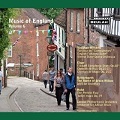 In
many respects this is the most attractive of Beulah’s recent releases.
Whatever other, more recent, recordings you may have of some or all
of the music, this album is well worth acquiring – 73 minutes of classic
performances, mostly in decent stereo and all of it well refurbished.
Whether you choose iTunes or Amazon, it’s all yours for less than
£8. I thoroughly enjoyed making the acquaintance of all these
recordings again and not just for the sake of nostalgia.
In
many respects this is the most attractive of Beulah’s recent releases.
Whatever other, more recent, recordings you may have of some or all
of the music, this album is well worth acquiring – 73 minutes of classic
performances, mostly in decent stereo and all of it well refurbished.
Whether you choose iTunes or Amazon, it’s all yours for less than
£8. I thoroughly enjoyed making the acquaintance of all these
recordings again and not just for the sake of nostalgia.
The VSOO items were made by Westminster and represent the best of the
recordings which Boult made for them – the Viennese orchestra’s Planets and Tallis Fantasia from the same period were
less than idiomatic. Falstaff comes from a recording made for
Pye/Nixa in 1956 and while there are some moments of insecurity in the
playing, they can easily be discounted in such an idiomatic performance.
The recording sounds very well for its date. Only a preference for Sir
Adrian’s less than ideal 1973 EMI recording would preclude purchasing
this version.
Boult’s Butterworth on its Ace of Clubs reissue, with music by
Walton and Van Beinum’s Elgar (The Wand of Youth), was my
introduction to The Banks of Green Willow and A Shropshire
Lad; it’s very sensitively performed and the recording still
sounds well. Boult’s stereo remake is available from Lyrita (SRCD.245: Recording of the Month – review, review and review).
Boult’s Perfect Fool in its stereo remake remains available
on a 2-CD British Collection set of Holst’s music (4701912)
or Australian Eloquence (4802323, 2 CDs, with Bernard Herrmann’s Planets) but the earlier performance is equally magic and the
mono sound has come up very well in the Beulah refurbishment.
Brian Reinhart’s Reviews
Favourite Music for Wind Quintet
Carl NIELSEN (1865-1931)
Wind Quintet, Op. 43 (1922) [25:48]
Ferenc FARKAS (1905-1972)
Antique Hungarian Dances (1959) [9:32]
Jacques IBERT (1890-1962)
Three Short Pieces (1930) [6:13]
Malcolm ARNOLD (1921-2006)
Three Shanties (1952) [7:04]
Frösunda Wind Quintet
rec. 16-18 March 1979, Wik Castle, Sweden
pdf booklet included
BIS-CD-136 [48:37] – from eclassical.com (mp3 and lossless) or stream from Naxos Music Library
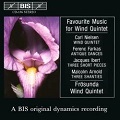 This
was one of eClassical’s supercheap
daily deals so I snapped up the FLACs. It’s a sheer delight
from first note to last. Seriously, if you’re in the least interested
by wind music you won’t stop smiling. The Frösunda Quintet
was a terrific ensemble with no weak links, and they have the amiable
disposition to dispatch all these works with flair.
This
was one of eClassical’s supercheap
daily deals so I snapped up the FLACs. It’s a sheer delight
from first note to last. Seriously, if you’re in the least interested
by wind music you won’t stop smiling. The Frösunda Quintet
was a terrific ensemble with no weak links, and they have the amiable
disposition to dispatch all these works with flair.
The Nielsen wind quintet is a repertoire classic, justifiably, and performed
brilliantly, but everything else here is inexplicably rare. Farkas’ Hungarian Dance tunes are pure folksy pleasure. Malcolm Arnold’s
shanties and Jacques Ibert’s miniatures are sweet treats too.
The playing time is short (48 minutes), but remember, eClassical charges
by length, so it’s going to be an even better bargain. Really,
if you find yourself not having fun at any point during this program,
call a mental health professional.
Antonio VIVALDI (1678-1741)
Four violin concertos, “The Four Seasons” [40:38]
Violin Concerto in C, RV 171 [9:46]
Concerto for Strings in B flat, RV 163, “Conca” [3:27]
Fabio Biondi (violin); Europa Galante
rec. 1991, Graz, Austria
NAÏVE LA COLLECTION NC40018 [54:13] – from classicsonline.com (mp3 and lossless)
Older release on OP569120 available in mp3 and lossless from eclassical.com.
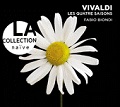 Naïve
has started reissuing some classic baroque and classical repertoire
in a budget line. They begin with, among other discs (one of which I’ll
get to right below), Fabio Biondi’s Four Seasons with Europa
Galante. Take note: this is not the same recording that has appeared
on Virgin Classics. The Virgin recording is gutsier, more dashing, and
more eccentric. On it you’re likely to hear less typical continuos
(organs, lutes), and a bracing amount of novel phrasings, dynamic shifts,
and ornamentations. Kirk McElhearn says of the newer Virgin recording,
“Not only is the performance itself far better, and more refined,
but the sound is far cleaner and more limpid. The 1992 recording (which
we’re discussing here – BR) sounds like a demo tape in comparison
to this version.”
Naïve
has started reissuing some classic baroque and classical repertoire
in a budget line. They begin with, among other discs (one of which I’ll
get to right below), Fabio Biondi’s Four Seasons with Europa
Galante. Take note: this is not the same recording that has appeared
on Virgin Classics. The Virgin recording is gutsier, more dashing, and
more eccentric. On it you’re likely to hear less typical continuos
(organs, lutes), and a bracing amount of novel phrasings, dynamic shifts,
and ornamentations. Kirk McElhearn says of the newer Virgin recording,
“Not only is the performance itself far better, and more refined,
but the sound is far cleaner and more limpid. The 1992 recording (which
we’re discussing here – BR) sounds like a demo tape in comparison
to this version.”
The drama, eccentricity, and lively flair are all here, too. They’re
just different, and a little more restrained. It’s a bit like hearing
a jazz trio play the same songs on two different nights. The texts are
the same, but everything feels a little different. I prefer the “night”
on Virgin, but if you appreciate what I’m saying about jazz and
improvisatory elements, you will like comparing the two. The Virgin
recording is my all-time favourite Four Seasons; this definitely
still stands in the top ten. You get two concertos as a bonus, including
the shortest Vivaldi concerto I’ve ever heard: just three minutes!
(NB: the UK download price of £7.99 (mp3) or £10.99
(lossless) is not competitive with the eclassical.com price of $9.56
for mp3 and lossless. One of the online suppliers who advertise on MusicWeb
International currently has the CD for £5.95, reduced from £8.15.
Like BR, I rate the later Biondi recording on Virgin (now Erato) as
one of my all-time favourites – review of budget box set of Op.3 and Op.8. BW.)
Wolfgang Amadeus MOZART (1756-1791)
Clarinet Quintet in A, K581 [31:38]
Trio for viola, clarinet, and piano, “Kegelstatt” [19:36]
Wolfgang Meyer (clarinet), Patrick Cohen (fortepiano), Quatuor Mosaïques
rec. 1985 and 1993 (?), other info not provided
NAÏVE LA COLLECTION 40023 [51:14] – from classicsonline.com (mp3 and lossless)
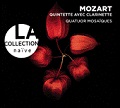 Now
here’s another in that Naïve series, available in MP3 or FLAC.
The Quatuor Mosaïques, probably the world’s leading period-instrument
quartet, plays Mozart’s Clarinet Quintet with Wolfgang Meyer. What
is it with clarinettists being named Meyer? See also: Sabine and Paul.
Now
here’s another in that Naïve series, available in MP3 or FLAC.
The Quatuor Mosaïques, probably the world’s leading period-instrument
quartet, plays Mozart’s Clarinet Quintet with Wolfgang Meyer. What
is it with clarinettists being named Meyer? See also: Sabine and Paul.
This one is, I’d say, not essential. The Kegelstatt Trio
is a wonderful performance, with the period basset clarinet and fortepiano
adding special interest. Patrick Cohen is excellent sitting in on piano.
But the Mosaïques’ period instruments only succeed in making
the writing of the quintet seem “thicker,” rougher. It’s
not like the performances are much faster than normal, they’re
just fuller and darker in tone. This might appeal to you, or not. Personally
I prefer the modern-instrument coupling of these two works starring
the Prazak Quartet and Pascal Moraguès.
You should also be aware of another period-instrument
recording of the clarinet quintet, coupled with a bunch of interesting
unfinished works, even a world premiere.
Anton BRUCKNER (1824-1896)
Symphony No. 7 in E major (ed. Skrowaczewski) (1881-83 rev. 1885) [68:56]
London Philharmonic Orchestra/Stanisław Skrowaczewski.
rec. live, 24 October 2012, Royal Festival Hall, London. DDD
pdf booklet included
LONDON PHILHARMONIC ORCHESTRA LPO-0071 [68:56] – from classicsonline.com (mp3 or lossless)
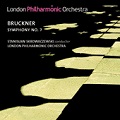 Stanisław
Skrowaczewski is one of the world’s leading Bruckner conductors.
His recorded cycle on Oehms is one of the great ones – and one of the
most underrated – and on this CD the London Philharmonic is performing
from a version of the score which he edited himself. Unfortunately for
my tastes, that means the second movement climax includes the timpani
and cymbal crash, but hey, nobody’s perfect.
Stanisław
Skrowaczewski is one of the world’s leading Bruckner conductors.
His recorded cycle on Oehms is one of the great ones – and one of the
most underrated – and on this CD the London Philharmonic is performing
from a version of the score which he edited himself. Unfortunately for
my tastes, that means the second movement climax includes the timpani
and cymbal crash, but hey, nobody’s perfect.
This is certainly a very good performance. The LPO strings glow with
health in the first two movements, and the trombones and tuba are impressive
in the last. Especially finely shaped are the rather awkward secondary
subjects in both of the first two movements. If you’re sensing
a “but” coming, here it is: I do prefer a slightly quicker
basic pace in the finale – 12:51 here; only Sanderling live on Hänssler
is both slower and better. The last movement does, just by a bit, lack
the vital force of the first three.
To give you an idea of where I’m coming from on this work, my reference
recordings are Blomstedt/Dresden, Jochum (EMI), Sanderling, and for
an eccentric (read: fast) alternative, Harnoncourt. Even in that company,
this new album earns a place. It’s a good start for the beginner
and a treat for the connoisseur.
Recording of the Month:
 Frédéric
CHOPIN (1810-1849)
Frédéric
CHOPIN (1810-1849)
Prelude No. 25 in c-sharp minor, Op. 45 [5:09]
Three Mazurkas, Op. 50 [10:54]
Fantasy in f minor, Op. 49 [12:55]
Three Mazurkas, Op. 56 [12:08]
Berceuse in D flat, Op. 57 [4:51]
Three Mazurkas, Op. 59 [9:45]
Barcarolle in F sharp, Op. 60 [9:06]
Polonaise No. 7 in A flat, Op. 61, “Polonaise-fantaisie” [14:00]
Katarzyna Popowa-Zydrón, piano
rec. 7-9 September 2012, Warsaw Philharmonic Concert Hall, Warsaw
CD Accord ACD189-2 [78:52] – from eclassical.com (mp3 and lossless) or stream from Naxos Music Library (both with pdf
booklet). Also available on CD from MusicWeb
International.
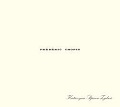 Easy
nominee for 2013 “Best Album with the Worst Cover Art.” Apparently
they were going for a sort of White Album effect here, but the
Chopin playing contained inside is far from bland or bizarre. Katarzyna
Popowa-Zydrón delivers excellent playing of the Fantaisie in f minor and Barcarolle, plus a fairly quick, effective Berceuse and a big grab-bag of mazurkas. The mazurkas don’t have as sharp
a rhythmic profile as some competitors, but that’s okay.
Easy
nominee for 2013 “Best Album with the Worst Cover Art.” Apparently
they were going for a sort of White Album effect here, but the
Chopin playing contained inside is far from bland or bizarre. Katarzyna
Popowa-Zydrón delivers excellent playing of the Fantaisie in f minor and Barcarolle, plus a fairly quick, effective Berceuse and a big grab-bag of mazurkas. The mazurkas don’t have as sharp
a rhythmic profile as some competitors, but that’s okay.
If it feels like there’s not much to say, well, there isn’t.
This is consistently high quality, maybe not unforgettable but Popowa-Zydrón
never puts a foot wrong and is never dull. I’ve reviewed ten new
Chopin releases in the last year and a half alone. For pure enjoyment
this ranks second behind Yevgeny Sudbin and ahead of, among others,
Lang Lang. By the way, Popowa-Zydrón was the piano teacher of
Rafal Blechacz. She was in the Chopin competition herself once, the
year of Krystian Zimerman’s triumph, but was knocked out of the
derby by a nasty case of the flu.
Ludwig van BEETHOVEN (1770-1827) Piano Sonata No. 30, Op. 110 [20:15]
Franz SCHUBERT (1797-1828) Piano Sonata No. 21, D960 [45:07]
Frédéric CHOPIN (1810-1849) Nocturne in C sharp
minor, Op. posth. [4:06]
Menahem Pressler (piano)
rec. February-March 2012, Potton Hall, Westleton, Suffolk, England
pdf booklet included
BIS-SACD-1999 [69:28] – from eclassical.com (mp3, 16– and 24-bit lossless) or stream from Naxos Music Library
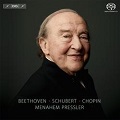 What
do we mean when we say an artist plays something “maturely”? This
is important because Menahem Pressler’s recital here, recorded
at age 88, comes across as being profoundly mature.
What
do we mean when we say an artist plays something “maturely”? This
is important because Menahem Pressler’s recital here, recorded
at age 88, comes across as being profoundly mature.
Well, I think, for starters it means the playing is not impulsive. Pressler
plays with care, with consideration, never indulging a chord or a particularly
pretty moment at the expense of preservation of tempo, of a sonata’s
structure. He’s not exactly cautious, but he’s also not exactly
going to do anything you have never heard before.
It also means the playing is error-free. I don’t mean technical
errors although there is a pretty iffy moment in the Beethoven fugue.
No, I mean errors in judgment or taste. Only the pickiest listener will
ever say, “that’s too loud, that’s too fast, that moment
is underplayed”; Pressler doesn’t need to be contrarian to
draw attention to himself. Heck, he doesn’t need to draw attention
to himself. His over fifty years with the Beaux Arts Trio have already
established him as one of the great piano artists of the century.
Like his solo career, this disc isn’t flashy. It isn’t one-of-a-kind.
The Beethoven is generous, broad in tempo, warm, like Gilels on DG but
with a little less emotional power in the final fugue. “Broad in
tempo” and “warm” also describe the Schubert, where the
scherzo is slower than most, and also where the dissonances of the first
movement are downplayed. That foreign, jarring E-natural in the beginning
melody’s second bar is totally inaudible. The Chopin nocturne is
tenderly played, but not indulged, because Pressler knows you don’t
have to swoon over every phrase to convey its feeling.
So I guess mature also means “literal” in some ways. This
recital is a whole lot less about the artist than it is about the composers.
It’s not attention-grabbing. I guess I’m not totally thrilled,
but that’s because this is not the “thrilling” kind of
pianism. While thrills can get old, good taste never does.











